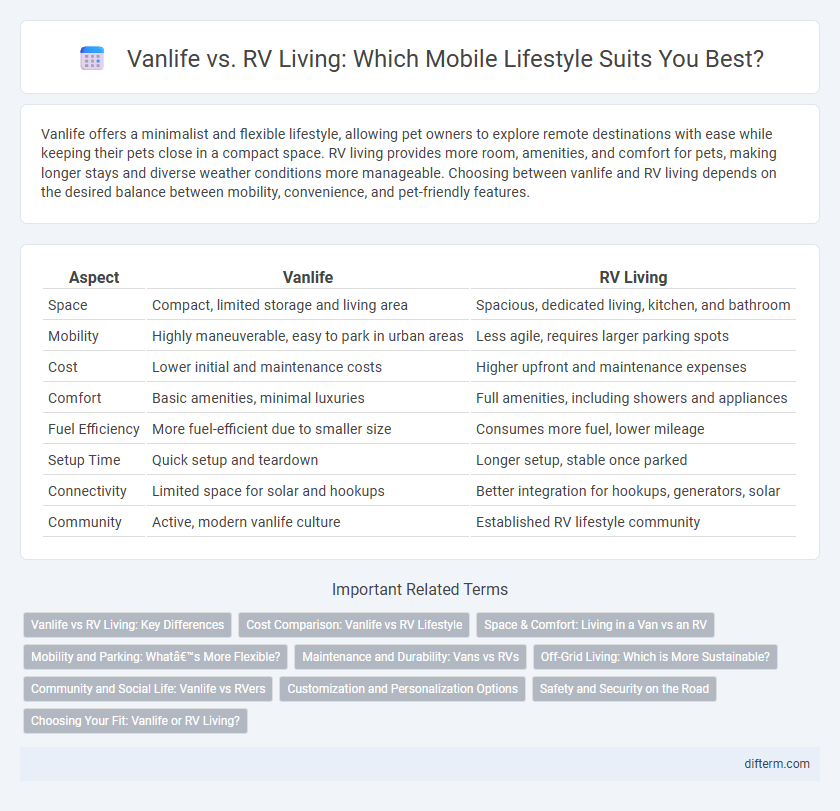Vanlife offers a minimalist and flexible lifestyle, allowing pet owners to explore remote destinations with ease while keeping their pets close in a compact space. RV living provides more room, amenities, and comfort for pets, making longer stays and diverse weather conditions more manageable. Choosing between vanlife and RV living depends on the desired balance between mobility, convenience, and pet-friendly features.
Table of Comparison
| Aspect | Vanlife | RV Living |
|---|---|---|
| Space | Compact, limited storage and living area | Spacious, dedicated living, kitchen, and bathroom |
| Mobility | Highly maneuverable, easy to park in urban areas | Less agile, requires larger parking spots |
| Cost | Lower initial and maintenance costs | Higher upfront and maintenance expenses |
| Comfort | Basic amenities, minimal luxuries | Full amenities, including showers and appliances |
| Fuel Efficiency | More fuel-efficient due to smaller size | Consumes more fuel, lower mileage |
| Setup Time | Quick setup and teardown | Longer setup, stable once parked |
| Connectivity | Limited space for solar and hookups | Better integration for hookups, generators, solar |
| Community | Active, modern vanlife culture | Established RV lifestyle community |
Vanlife vs RV Living: Key Differences
Vanlife emphasizes minimalist living and mobility in compact camper vans, ideal for urban access and off-grid adventures, while RV living offers larger, more equipped motorhomes or trailers with amenities tailored for extended stays and family comfort. Vanlife suits individuals prioritizing flexibility and simplicity, whereas RV living appeals to those seeking spacious interiors, home-like features, and longer travel durations. The choice between vanlife and RV living hinges on lifestyle preferences, travel goals, and the balance between convenience and freedom on the road.
Cost Comparison: Vanlife vs RV Lifestyle
Vanlife generally offers a lower upfront investment, with converted vans costing between $20,000 to $50,000 compared to RVs priced from $50,000 to over $150,000. Operating expenses for vanlife are often reduced due to smaller fuel consumption and maintenance costs, while RV living incurs higher costs for insurance, campground fees, and upkeep. Budget-conscious travelers prioritize vanlife for affordability, whereas RV owners benefit from larger living space but face increased financial commitment.
Space & Comfort: Living in a Van vs an RV
Living in an RV typically offers significantly more space and comfort compared to vanlife, with larger interiors, full-sized beds, and built-in kitchen and bathroom facilities. Vans provide greater maneuverability and ease of parking but require clever space optimization and multi-use furniture to maximize comfort in a compact environment. The choice between vanlife and RV living often depends on the balance between mobility and the desire for home-like amenities.
Mobility and Parking: What’s More Flexible?
Vanlife offers superior mobility with easier access to narrow roads and tighter parking spots, making it ideal for spontaneous travel and urban exploring. RV living provides more spacious accommodations but often requires designated campsites with sufficient parking spaces, limiting flexibility. For travelers prioritizing freedom to park and move frequently, vanlife is generally the more adaptable option.
Maintenance and Durability: Vans vs RVs
Vans typically require less frequent maintenance due to their smaller size and simpler mechanical systems, making them more durable for long-term travel. RVs, while offering more living space, often demand higher upkeep costs and more complex repairs because of their larger engines and integrated utilities. Choosing vans over RVs can result in lower maintenance expenses and increased reliability on the road.
Off-Grid Living: Which is More Sustainable?
Vanlife often offers greater sustainability in off-grid living due to its smaller energy consumption and reduced environmental footprint compared to larger RVs, which typically require more fuel and maintenance. Solar panel installations and efficient water systems in vans enable extended autonomy, minimizing reliance on external resources. However, RV living can support longer off-grid stays with larger capacity for renewable energy storage and waste management, providing a balance between sustainability and comfort.
Community and Social Life: Vanlife vs RVers
Vanlife fosters intimate, tight-knit communities often formed through social media groups and meetups, where travelers share tips and experiences in real-time. RV living builds more structured, larger social networks with frequent interactions in established campgrounds and RV parks, offering organized events and amenities. Both lifestyles emphasize connection but differ in the scale and nature of social engagement, with vanlife leaning towards spontaneous gatherings and RV living providing consistent community-oriented activities.
Customization and Personalization Options
Vanlife offers extensive customization opportunities, allowing travelers to design compact, multifunctional spaces tailored to their unique lifestyle and needs, often focusing on maximizing every inch with built-in furniture and modular storage. RV living provides a broader range of personalization through larger living areas, customizable floor plans, and integrated amenities such as full kitchens and bathrooms, catering to those seeking home-like comfort on the road. Both lifestyles emphasize personal expression but differ significantly in scale and flexibility of customization, with vanlife favoring minimalism and RV living enabling more extensive personalization.
Safety and Security on the Road
Vanlife offers greater flexibility and stealth, which can enhance safety by allowing discreet parking in secure, less crowded locations, while RV living provides built-in security features like sturdy locks and alarm systems. RVs often come equipped with advanced safety technologies, including smoke detectors, GPS tracking, and reinforced structures, which contribute to increased protection on the road. Both lifestyle choices require mindfulness about campsite selection and awareness of surroundings to maximize personal safety and minimize risks.
Choosing Your Fit: Vanlife or RV Living?
Vanlife offers unparalleled freedom with easy access to remote locations and minimalist living, appealing to those who prioritize flexibility and a compact lifestyle. RV living provides more spacious accommodations and built-in amenities, making it ideal for families or individuals seeking comfort and extended stays. Choosing between vanlife and RV living depends on your travel style, space needs, and desire for mobility versus convenience.
vanlife vs RV living Infographic

 difterm.com
difterm.com